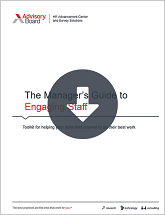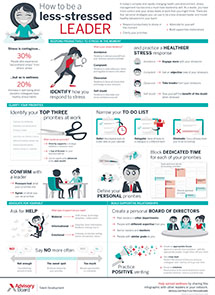Auto logout in seconds.
Continue LogoutWhile long weekends allow more time for rest and travel, social science experts say you might reap more benefits from a midweek break—which is why Doximity employees work from home every Wednesday.
New infographic: Here are 4 ways to be a less-stressed leader
A 'happily productive accident' for Doximity
The work-from-home Wednesday policy came into being "serendipitously," Shari Buck, co-founder of Doximity, writes for Quartz. For years, she worked from home every Wednesday to teach at her kids' school in the mornings while maintaining her work as co-founder of the medical network.
Now, all 280 employees follow the same rule—in fact, Doximity shuts down its office midweek.
For Buck and other Doximity employees, the midweek office break has proven to be productive in two ways: One, according to Buck, "is that it breaks up the week nicely." She writes, "[It] leads to a consistent workflow ...early in the week, a productive Wednesday working from home, and two equally productive and collaborative days on the tail end of the week."
Another reason, according to Buck, is that having the work-from-home day in the middle of the week, prevents employees from viewing the day as a "faux three-day weeken[d]," Buck writes.
"WFH Wednesdays have boosted work-life balance for all of our employees," Buck writes. "At the same time, they have kept our business productive and on a path of positive growth for nearly a decade."
The value of mid-week break
There is some science behind the value of an official mid-week break, too—not just a work-from-home day. In fact, to get the most "recharge" out of a vacation day, experts say take it on a Wednesday, Annaliese Griffin writes for Quartz.
The reason for this has to do with our internal rhythm or "pacers," according to Dawna Ballard, a communications professor and scholar of chronemics at University of Texas-Austin.
According to Ballard, everyone's pace is different. "Some people are slower moving, some people are faster moving. The workweek schedule, "throws that out the window and says actually, this is how fast you have to work, this is when you have to work."
According to Griffin, the five-day workweek is "our most fundamental [external] pacer": It establishes a cycle that affects and controls our experience of time.
But on the weekend, your internal pacer kicks in because you no longer have to meet deadlines or wake up at unnatural hours, Ballard said. And that explains why people dread Mondays, Ballard writes, explaining that Monday typically means that those external pacers must again dominate, and people again have to shift from internal to external pacers. "It's having to go from your pacer, back to this other pacer, there's that friction," she explained.
But she said, giving yourself a vacation—or even just working from home—in the middle of the week interrupts that external pacer and allows your natural, internal pacers to take over for a day, Griffin writes. If you simply extend your weekend by taking Monday off, the shift from internal to external pacers is still going to take place—just one day later (Buck, "Quartz at Work," Quartz, 5/2; Griffin, "Quartzy," Quartz, 7/30).
Be less stressed—and more productive—with these 5 infographics
Download our 5 most popular infographics to help you stay less stressed and more productive at work.
Don't miss out on the latest Advisory Board insights
Create your free account to access 1 resource, including the latest research and webinars.
Want access without creating an account?
You have 1 free members-only resource remaining this month.
1 free members-only resources remaining
1 free members-only resources remaining
You've reached your limit of free insights
Become a member to access all of Advisory Board's resources, events, and experts
Never miss out on the latest innovative health care content tailored to you.
Benefits include:
You've reached your limit of free insights
Become a member to access all of Advisory Board's resources, events, and experts
Never miss out on the latest innovative health care content tailored to you.
Benefits include:
This content is available through your Curated Research partnership with Advisory Board. Click on ‘view this resource’ to read the full piece
Email ask@advisory.com to learn more
Click on ‘Become a Member’ to learn about the benefits of a Full-Access partnership with Advisory Board
Never miss out on the latest innovative health care content tailored to you.
Benefits Include:
This is for members only. Learn more.
Click on ‘Become a Member’ to learn about the benefits of a Full-Access partnership with Advisory Board
Never miss out on the latest innovative health care content tailored to you.


